Analysis of Mandatory Reporting and Child Abuse in Washington
VerifiedAdded on 2022/09/02
|12
|2886
|15
Report
AI Summary
This report delves into the complexities of mandatory reporting and child abuse within the state of Washington. It begins by defining mandatory reporting and identifying various professionals, including DSHS employees, law enforcement, social workers, and healthcare providers, who are legally obligated to report instances of child abuse, abandonment, neglect, and vulnerable adult exploitation, as per RCW 74.34.020. The report also outlines ethical codes, emphasizing impartiality, conflict of interest disclosure, confidentiality, and accurate public statements. It compares Washington's mandatory reporting requirements with those of other states and WHO guidelines. A case study is presented, examining ethical breaches by a social worker who failed to report a client's neglect of a child, violating principles of fairness and truthfulness. The report further discusses the principles of mandatory reporting procedures, including reporting standards, institutional responsibilities, and privileged communications. Finally, the report analyzes potential courses of action in the case study, highlighting the importance of reporting to DSHS to ensure child safety and address underlying socio-cultural issues contributing to neglect.
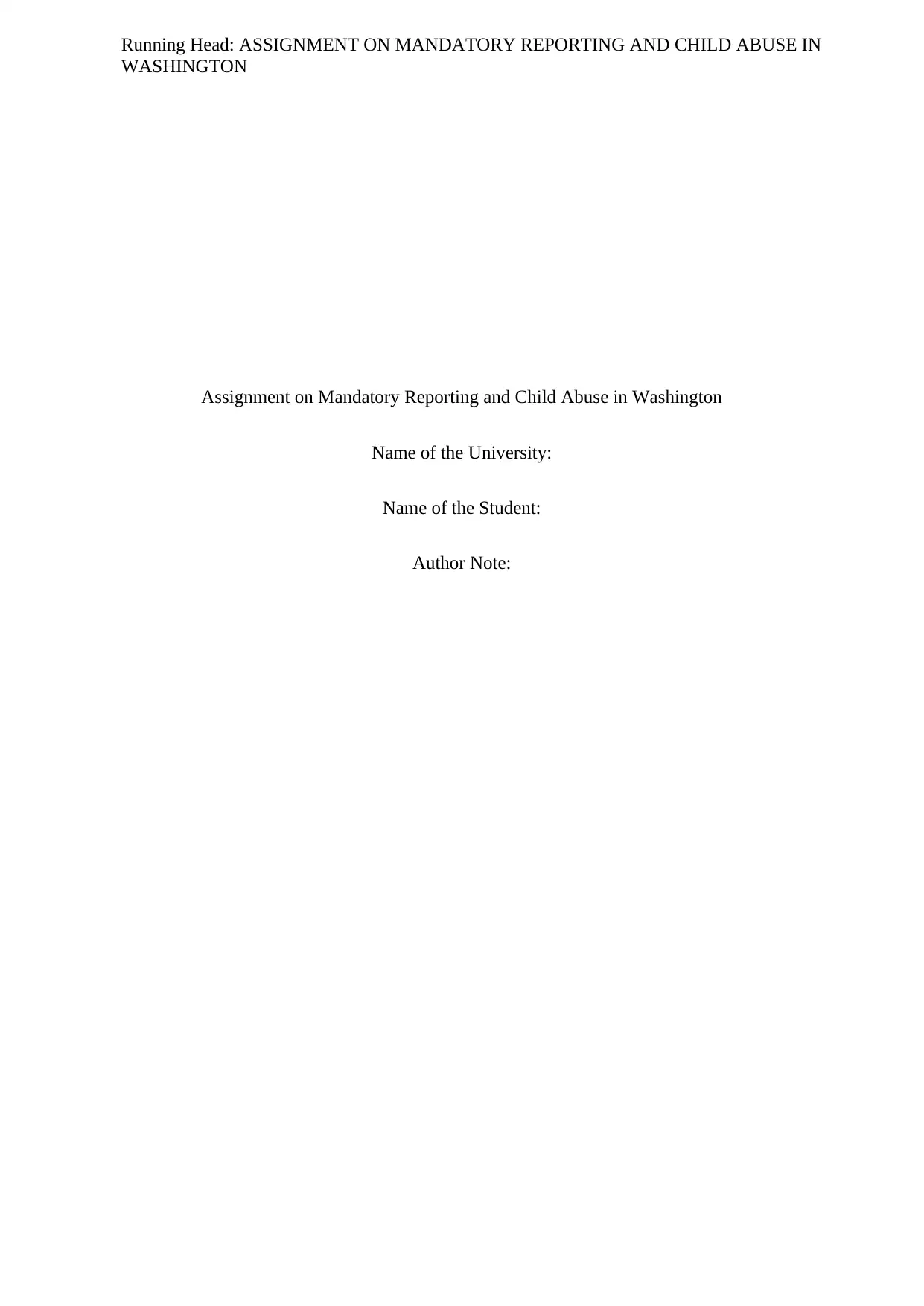
Running Head: ASSIGNMENT ON MANDATORY REPORTING AND CHILD ABUSE IN
WASHINGTON
Assignment on Mandatory Reporting and Child Abuse in Washington
Name of the University:
Name of the Student:
Author Note:
WASHINGTON
Assignment on Mandatory Reporting and Child Abuse in Washington
Name of the University:
Name of the Student:
Author Note:
Paraphrase This Document
Need a fresh take? Get an instant paraphrase of this document with our AI Paraphraser
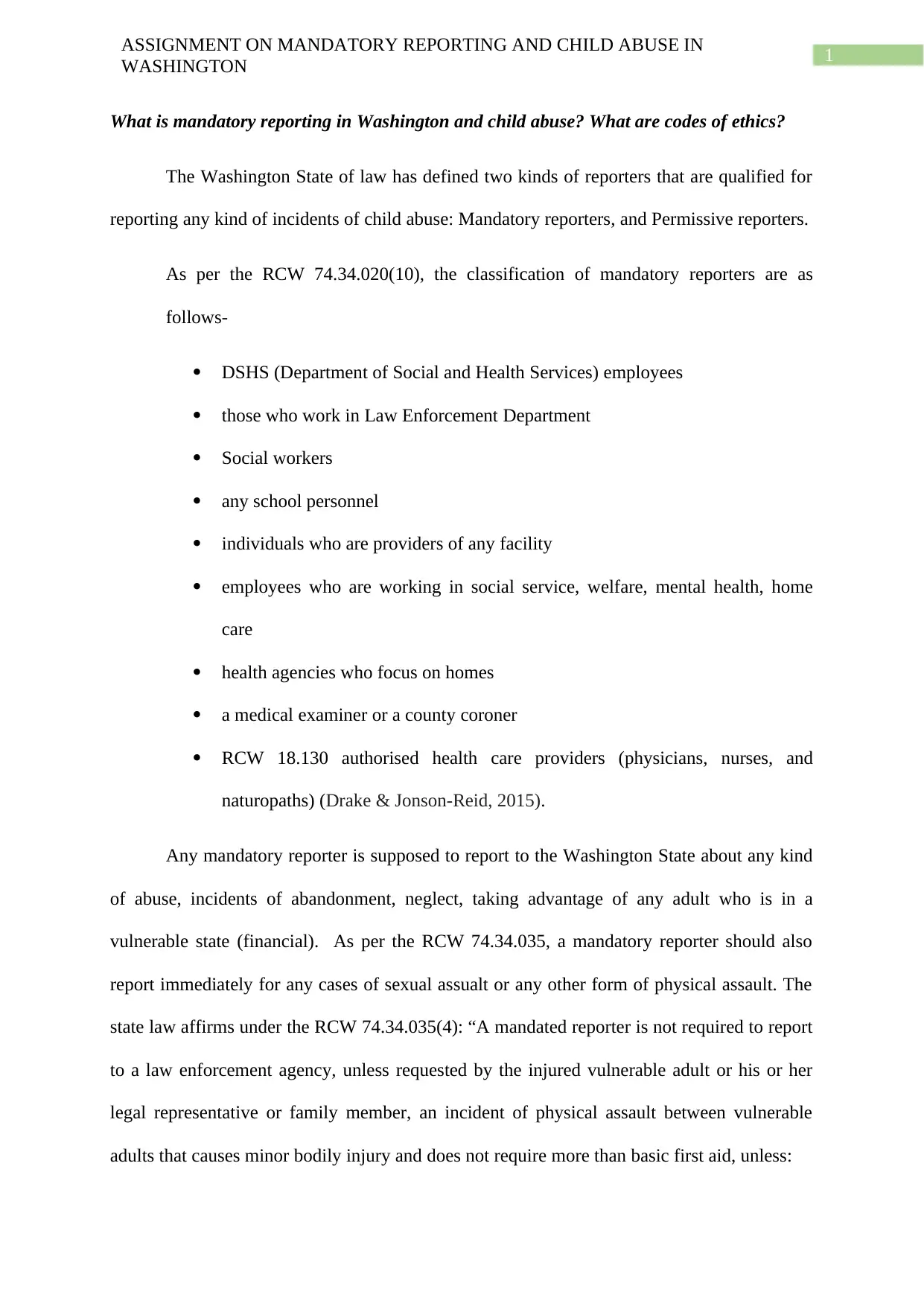
1
ASSIGNMENT ON MANDATORY REPORTING AND CHILD ABUSE IN
WASHINGTON
What is mandatory reporting in Washington and child abuse? What are codes of ethics?
The Washington State of law has defined two kinds of reporters that are qualified for
reporting any kind of incidents of child abuse: Mandatory reporters, and Permissive reporters.
As per the RCW 74.34.020(10), the classification of mandatory reporters are as
follows-
DSHS (Department of Social and Health Services) employees
those who work in Law Enforcement Department
Social workers
any school personnel
individuals who are providers of any facility
employees who are working in social service, welfare, mental health, home
care
health agencies who focus on homes
a medical examiner or a county coroner
RCW 18.130 authorised health care providers (physicians, nurses, and
naturopaths) (Drake & Jonson-Reid, 2015).
Any mandatory reporter is supposed to report to the Washington State about any kind
of abuse, incidents of abandonment, neglect, taking advantage of any adult who is in a
vulnerable state (financial). As per the RCW 74.34.035, a mandatory reporter should also
report immediately for any cases of sexual assualt or any other form of physical assault. The
state law affirms under the RCW 74.34.035(4): “A mandated reporter is not required to report
to a law enforcement agency, unless requested by the injured vulnerable adult or his or her
legal representative or family member, an incident of physical assault between vulnerable
adults that causes minor bodily injury and does not require more than basic first aid, unless:
ASSIGNMENT ON MANDATORY REPORTING AND CHILD ABUSE IN
WASHINGTON
What is mandatory reporting in Washington and child abuse? What are codes of ethics?
The Washington State of law has defined two kinds of reporters that are qualified for
reporting any kind of incidents of child abuse: Mandatory reporters, and Permissive reporters.
As per the RCW 74.34.020(10), the classification of mandatory reporters are as
follows-
DSHS (Department of Social and Health Services) employees
those who work in Law Enforcement Department
Social workers
any school personnel
individuals who are providers of any facility
employees who are working in social service, welfare, mental health, home
care
health agencies who focus on homes
a medical examiner or a county coroner
RCW 18.130 authorised health care providers (physicians, nurses, and
naturopaths) (Drake & Jonson-Reid, 2015).
Any mandatory reporter is supposed to report to the Washington State about any kind
of abuse, incidents of abandonment, neglect, taking advantage of any adult who is in a
vulnerable state (financial). As per the RCW 74.34.035, a mandatory reporter should also
report immediately for any cases of sexual assualt or any other form of physical assault. The
state law affirms under the RCW 74.34.035(4): “A mandated reporter is not required to report
to a law enforcement agency, unless requested by the injured vulnerable adult or his or her
legal representative or family member, an incident of physical assault between vulnerable
adults that causes minor bodily injury and does not require more than basic first aid, unless:
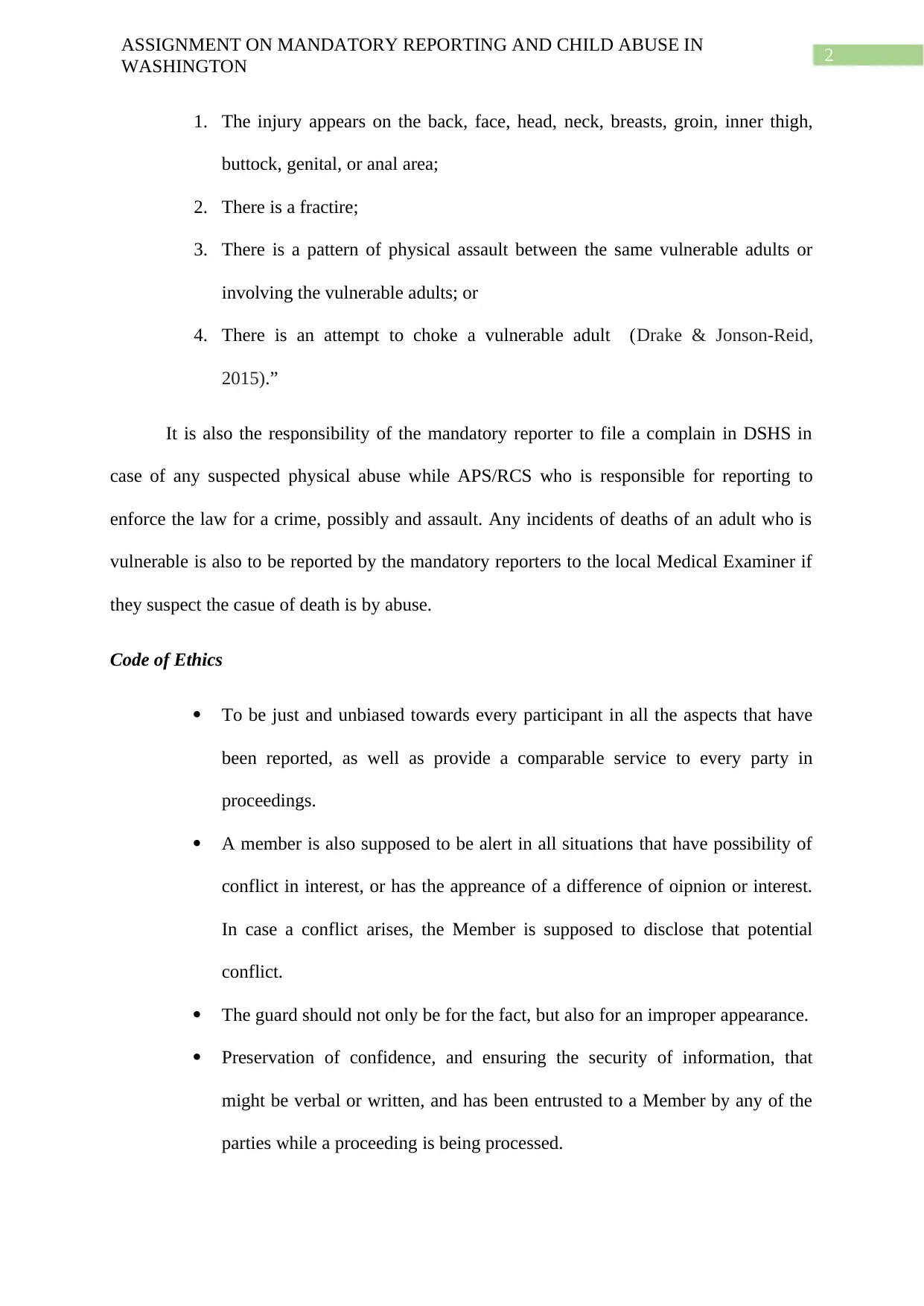
2
ASSIGNMENT ON MANDATORY REPORTING AND CHILD ABUSE IN
WASHINGTON
1. The injury appears on the back, face, head, neck, breasts, groin, inner thigh,
buttock, genital, or anal area;
2. There is a fractire;
3. There is a pattern of physical assault between the same vulnerable adults or
involving the vulnerable adults; or
4. There is an attempt to choke a vulnerable adult (Drake & Jonson-Reid,
2015).”
It is also the responsibility of the mandatory reporter to file a complain in DSHS in
case of any suspected physical abuse while APS/RCS who is responsible for reporting to
enforce the law for a crime, possibly and assault. Any incidents of deaths of an adult who is
vulnerable is also to be reported by the mandatory reporters to the local Medical Examiner if
they suspect the casue of death is by abuse.
Code of Ethics
To be just and unbiased towards every participant in all the aspects that have
been reported, as well as provide a comparable service to every party in
proceedings.
A member is also supposed to be alert in all situations that have possibility of
conflict in interest, or has the appreance of a difference of oipnion or interest.
In case a conflict arises, the Member is supposed to disclose that potential
conflict.
The guard should not only be for the fact, but also for an improper appearance.
Preservation of confidence, and ensuring the security of information, that
might be verbal or written, and has been entrusted to a Member by any of the
parties while a proceeding is being processed.
ASSIGNMENT ON MANDATORY REPORTING AND CHILD ABUSE IN
WASHINGTON
1. The injury appears on the back, face, head, neck, breasts, groin, inner thigh,
buttock, genital, or anal area;
2. There is a fractire;
3. There is a pattern of physical assault between the same vulnerable adults or
involving the vulnerable adults; or
4. There is an attempt to choke a vulnerable adult (Drake & Jonson-Reid,
2015).”
It is also the responsibility of the mandatory reporter to file a complain in DSHS in
case of any suspected physical abuse while APS/RCS who is responsible for reporting to
enforce the law for a crime, possibly and assault. Any incidents of deaths of an adult who is
vulnerable is also to be reported by the mandatory reporters to the local Medical Examiner if
they suspect the casue of death is by abuse.
Code of Ethics
To be just and unbiased towards every participant in all the aspects that have
been reported, as well as provide a comparable service to every party in
proceedings.
A member is also supposed to be alert in all situations that have possibility of
conflict in interest, or has the appreance of a difference of oipnion or interest.
In case a conflict arises, the Member is supposed to disclose that potential
conflict.
The guard should not only be for the fact, but also for an improper appearance.
Preservation of confidence, and ensuring the security of information, that
might be verbal or written, and has been entrusted to a Member by any of the
parties while a proceeding is being processed.
⊘ This is a preview!⊘
Do you want full access?
Subscribe today to unlock all pages.

Trusted by 1+ million students worldwide
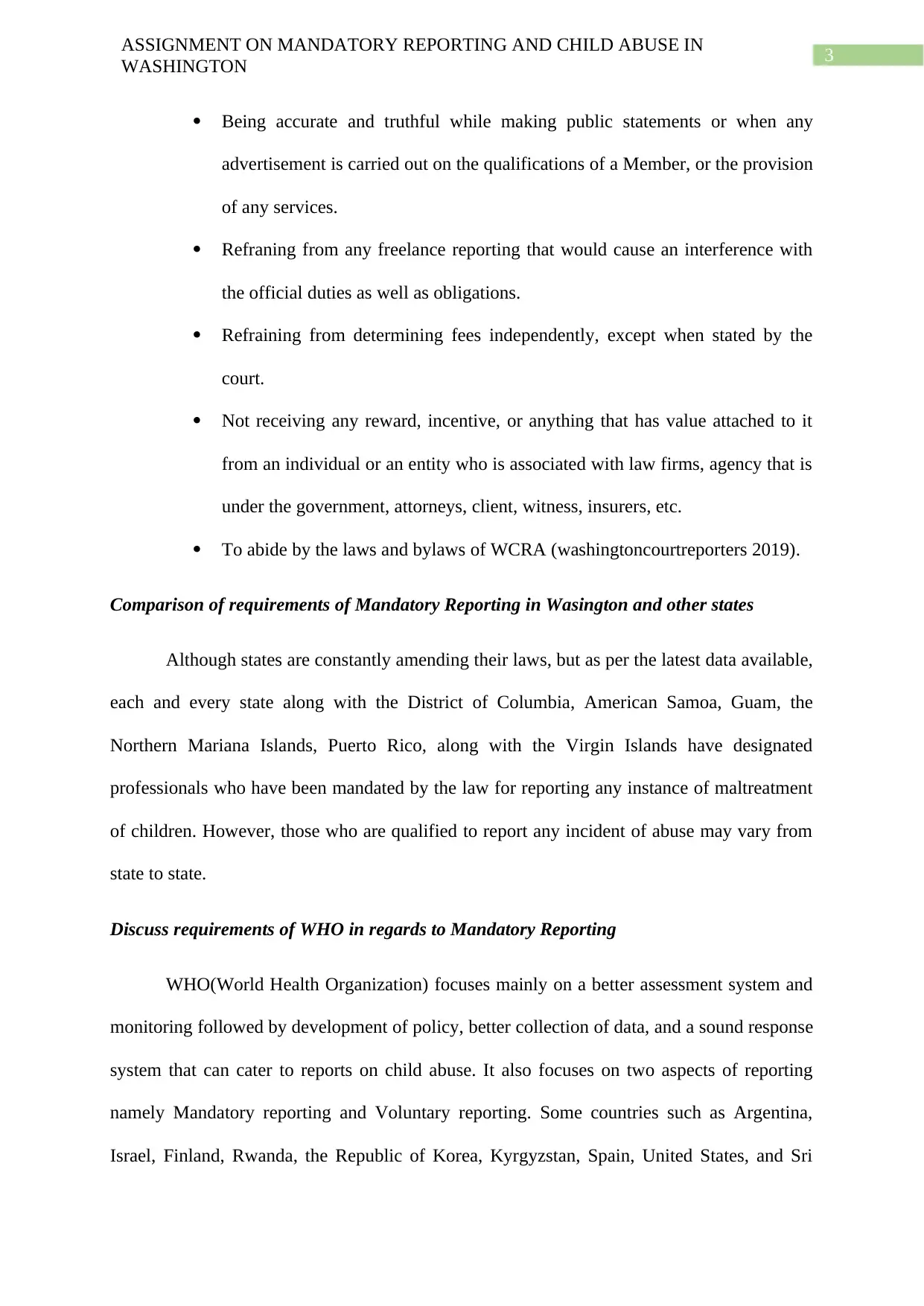
3
ASSIGNMENT ON MANDATORY REPORTING AND CHILD ABUSE IN
WASHINGTON
Being accurate and truthful while making public statements or when any
advertisement is carried out on the qualifications of a Member, or the provision
of any services.
Refraning from any freelance reporting that would cause an interference with
the official duties as well as obligations.
Refraining from determining fees independently, except when stated by the
court.
Not receiving any reward, incentive, or anything that has value attached to it
from an individual or an entity who is associated with law firms, agency that is
under the government, attorneys, client, witness, insurers, etc.
To abide by the laws and bylaws of WCRA (washingtoncourtreporters 2019).
Comparison of requirements of Mandatory Reporting in Wasington and other states
Although states are constantly amending their laws, but as per the latest data available,
each and every state along with the District of Columbia, American Samoa, Guam, the
Northern Mariana Islands, Puerto Rico, along with the Virgin Islands have designated
professionals who have been mandated by the law for reporting any instance of maltreatment
of children. However, those who are qualified to report any incident of abuse may vary from
state to state.
Discuss requirements of WHO in regards to Mandatory Reporting
WHO(World Health Organization) focuses mainly on a better assessment system and
monitoring followed by development of policy, better collection of data, and a sound response
system that can cater to reports on child abuse. It also focuses on two aspects of reporting
namely Mandatory reporting and Voluntary reporting. Some countries such as Argentina,
Israel, Finland, Rwanda, the Republic of Korea, Kyrgyzstan, Spain, United States, and Sri
ASSIGNMENT ON MANDATORY REPORTING AND CHILD ABUSE IN
WASHINGTON
Being accurate and truthful while making public statements or when any
advertisement is carried out on the qualifications of a Member, or the provision
of any services.
Refraning from any freelance reporting that would cause an interference with
the official duties as well as obligations.
Refraining from determining fees independently, except when stated by the
court.
Not receiving any reward, incentive, or anything that has value attached to it
from an individual or an entity who is associated with law firms, agency that is
under the government, attorneys, client, witness, insurers, etc.
To abide by the laws and bylaws of WCRA (washingtoncourtreporters 2019).
Comparison of requirements of Mandatory Reporting in Wasington and other states
Although states are constantly amending their laws, but as per the latest data available,
each and every state along with the District of Columbia, American Samoa, Guam, the
Northern Mariana Islands, Puerto Rico, along with the Virgin Islands have designated
professionals who have been mandated by the law for reporting any instance of maltreatment
of children. However, those who are qualified to report any incident of abuse may vary from
state to state.
Discuss requirements of WHO in regards to Mandatory Reporting
WHO(World Health Organization) focuses mainly on a better assessment system and
monitoring followed by development of policy, better collection of data, and a sound response
system that can cater to reports on child abuse. It also focuses on two aspects of reporting
namely Mandatory reporting and Voluntary reporting. Some countries such as Argentina,
Israel, Finland, Rwanda, the Republic of Korea, Kyrgyzstan, Spain, United States, and Sri
Paraphrase This Document
Need a fresh take? Get an instant paraphrase of this document with our AI Paraphraser
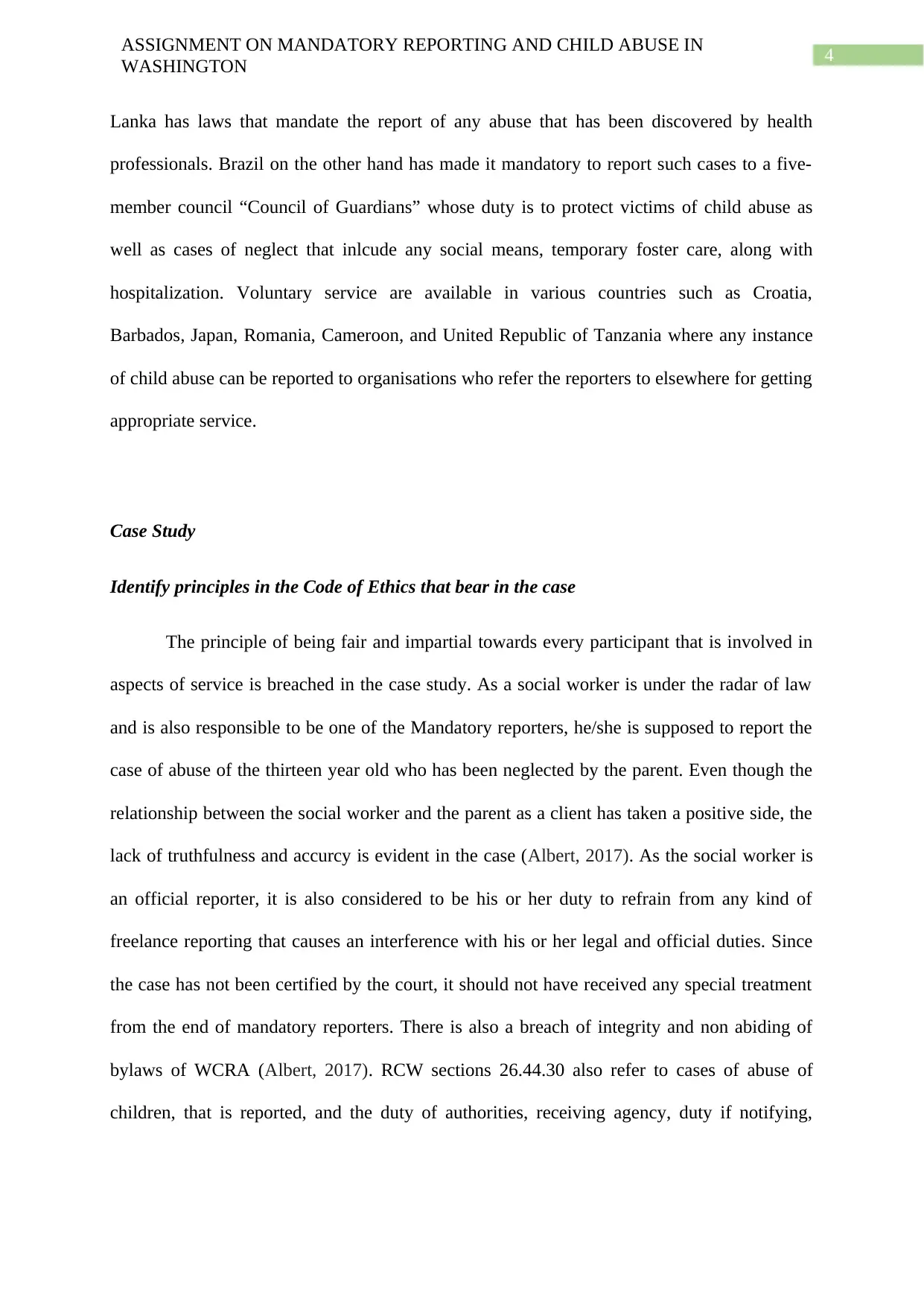
4
ASSIGNMENT ON MANDATORY REPORTING AND CHILD ABUSE IN
WASHINGTON
Lanka has laws that mandate the report of any abuse that has been discovered by health
professionals. Brazil on the other hand has made it mandatory to report such cases to a five-
member council “Council of Guardians” whose duty is to protect victims of child abuse as
well as cases of neglect that inlcude any social means, temporary foster care, along with
hospitalization. Voluntary service are available in various countries such as Croatia,
Barbados, Japan, Romania, Cameroon, and United Republic of Tanzania where any instance
of child abuse can be reported to organisations who refer the reporters to elsewhere for getting
appropriate service.
Case Study
Identify principles in the Code of Ethics that bear in the case
The principle of being fair and impartial towards every participant that is involved in
aspects of service is breached in the case study. As a social worker is under the radar of law
and is also responsible to be one of the Mandatory reporters, he/she is supposed to report the
case of abuse of the thirteen year old who has been neglected by the parent. Even though the
relationship between the social worker and the parent as a client has taken a positive side, the
lack of truthfulness and accurcy is evident in the case (Albert, 2017). As the social worker is
an official reporter, it is also considered to be his or her duty to refrain from any kind of
freelance reporting that causes an interference with his or her legal and official duties. Since
the case has not been certified by the court, it should not have received any special treatment
from the end of mandatory reporters. There is also a breach of integrity and non abiding of
bylaws of WCRA (Albert, 2017). RCW sections 26.44.30 also refer to cases of abuse of
children, that is reported, and the duty of authorities, receiving agency, duty if notifying,
ASSIGNMENT ON MANDATORY REPORTING AND CHILD ABUSE IN
WASHINGTON
Lanka has laws that mandate the report of any abuse that has been discovered by health
professionals. Brazil on the other hand has made it mandatory to report such cases to a five-
member council “Council of Guardians” whose duty is to protect victims of child abuse as
well as cases of neglect that inlcude any social means, temporary foster care, along with
hospitalization. Voluntary service are available in various countries such as Croatia,
Barbados, Japan, Romania, Cameroon, and United Republic of Tanzania where any instance
of child abuse can be reported to organisations who refer the reporters to elsewhere for getting
appropriate service.
Case Study
Identify principles in the Code of Ethics that bear in the case
The principle of being fair and impartial towards every participant that is involved in
aspects of service is breached in the case study. As a social worker is under the radar of law
and is also responsible to be one of the Mandatory reporters, he/she is supposed to report the
case of abuse of the thirteen year old who has been neglected by the parent. Even though the
relationship between the social worker and the parent as a client has taken a positive side, the
lack of truthfulness and accurcy is evident in the case (Albert, 2017). As the social worker is
an official reporter, it is also considered to be his or her duty to refrain from any kind of
freelance reporting that causes an interference with his or her legal and official duties. Since
the case has not been certified by the court, it should not have received any special treatment
from the end of mandatory reporters. There is also a breach of integrity and non abiding of
bylaws of WCRA (Albert, 2017). RCW sections 26.44.30 also refer to cases of abuse of
children, that is reported, and the duty of authorities, receiving agency, duty if notifying,
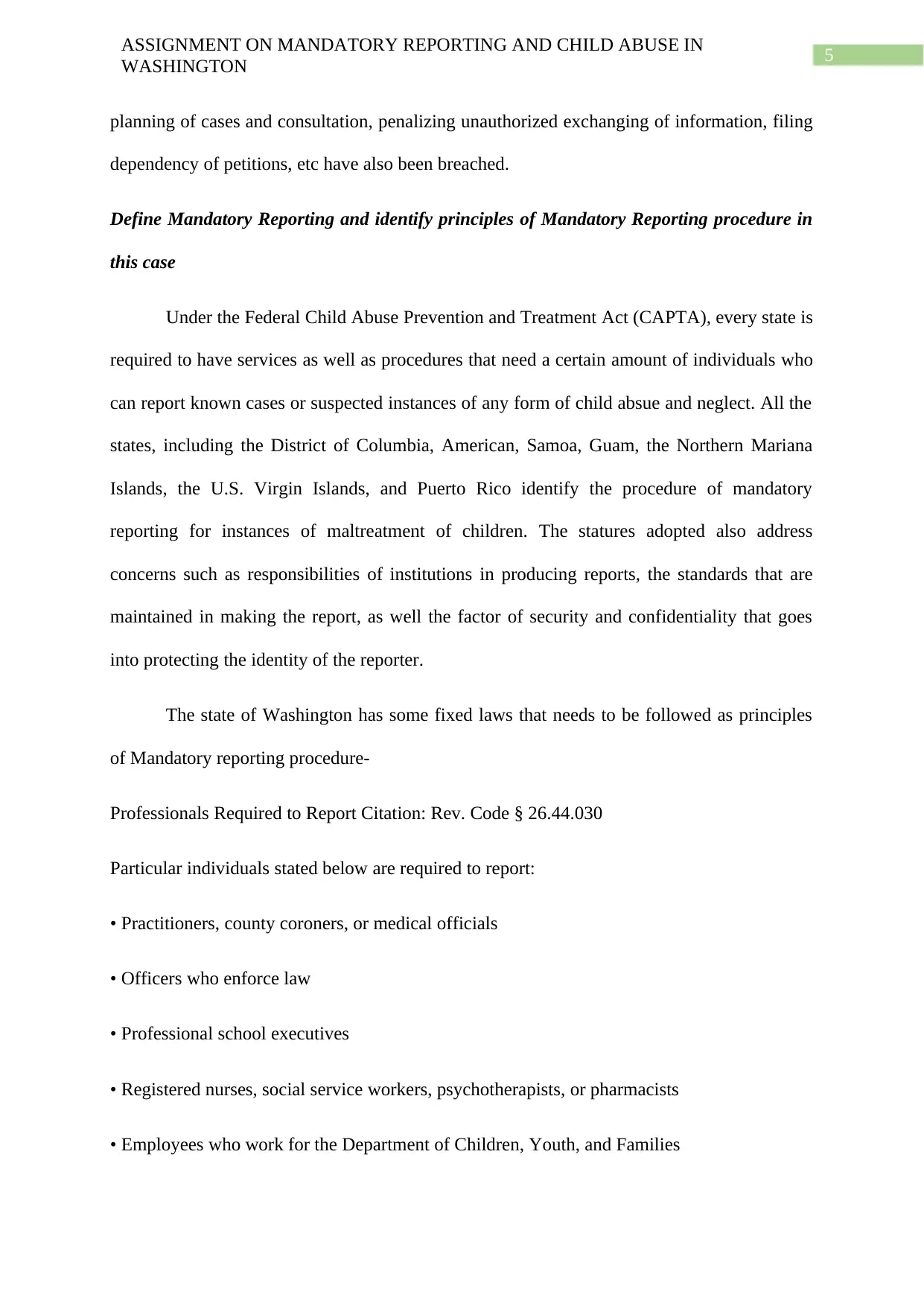
5
ASSIGNMENT ON MANDATORY REPORTING AND CHILD ABUSE IN
WASHINGTON
planning of cases and consultation, penalizing unauthorized exchanging of information, filing
dependency of petitions, etc have also been breached.
Define Mandatory Reporting and identify principles of Mandatory Reporting procedure in
this case
Under the Federal Child Abuse Prevention and Treatment Act (CAPTA), every state is
required to have services as well as procedures that need a certain amount of individuals who
can report known cases or suspected instances of any form of child absue and neglect. All the
states, including the District of Columbia, American, Samoa, Guam, the Northern Mariana
Islands, the U.S. Virgin Islands, and Puerto Rico identify the procedure of mandatory
reporting for instances of maltreatment of children. The statures adopted also address
concerns such as responsibilities of institutions in producing reports, the standards that are
maintained in making the report, as well the factor of security and confidentiality that goes
into protecting the identity of the reporter.
The state of Washington has some fixed laws that needs to be followed as principles
of Mandatory reporting procedure-
Professionals Required to Report Citation: Rev. Code § 26.44.030
Particular individuals stated below are required to report:
• Practitioners, county coroners, or medical officials
• Officers who enforce law
• Professional school executives
• Registered nurses, social service workers, psychotherapists, or pharmacists
• Employees who work for the Department of Children, Youth, and Families
ASSIGNMENT ON MANDATORY REPORTING AND CHILD ABUSE IN
WASHINGTON
planning of cases and consultation, penalizing unauthorized exchanging of information, filing
dependency of petitions, etc have also been breached.
Define Mandatory Reporting and identify principles of Mandatory Reporting procedure in
this case
Under the Federal Child Abuse Prevention and Treatment Act (CAPTA), every state is
required to have services as well as procedures that need a certain amount of individuals who
can report known cases or suspected instances of any form of child absue and neglect. All the
states, including the District of Columbia, American, Samoa, Guam, the Northern Mariana
Islands, the U.S. Virgin Islands, and Puerto Rico identify the procedure of mandatory
reporting for instances of maltreatment of children. The statures adopted also address
concerns such as responsibilities of institutions in producing reports, the standards that are
maintained in making the report, as well the factor of security and confidentiality that goes
into protecting the identity of the reporter.
The state of Washington has some fixed laws that needs to be followed as principles
of Mandatory reporting procedure-
Professionals Required to Report Citation: Rev. Code § 26.44.030
Particular individuals stated below are required to report:
• Practitioners, county coroners, or medical officials
• Officers who enforce law
• Professional school executives
• Registered nurses, social service workers, psychotherapists, or pharmacists
• Employees who work for the Department of Children, Youth, and Families
⊘ This is a preview!⊘
Do you want full access?
Subscribe today to unlock all pages.

Trusted by 1+ million students worldwide
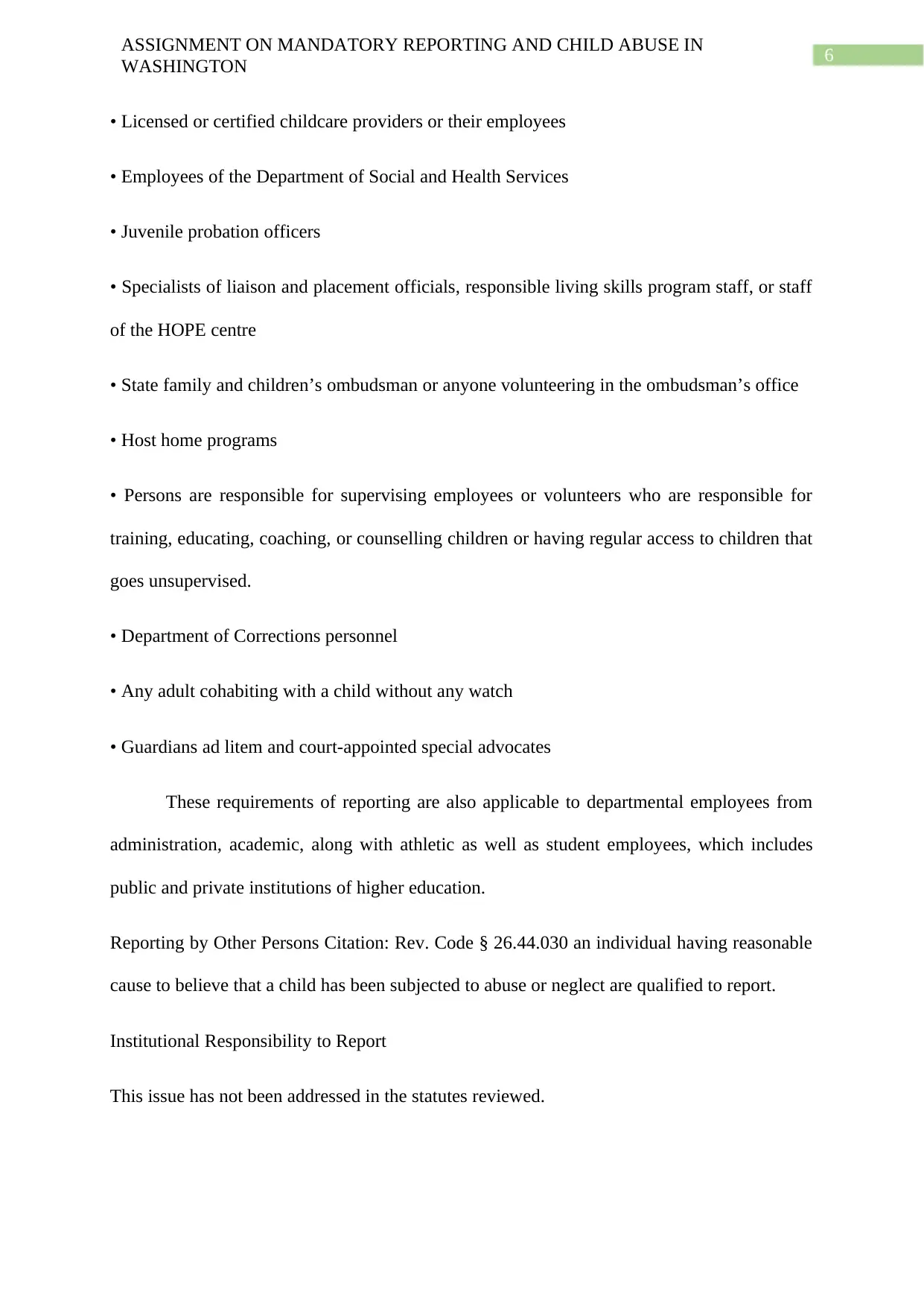
6
ASSIGNMENT ON MANDATORY REPORTING AND CHILD ABUSE IN
WASHINGTON
• Licensed or certified childcare providers or their employees
• Employees of the Department of Social and Health Services
• Juvenile probation officers
• Specialists of liaison and placement officials, responsible living skills program staff, or staff
of the HOPE centre
• State family and children’s ombudsman or anyone volunteering in the ombudsman’s office
• Host home programs
• Persons are responsible for supervising employees or volunteers who are responsible for
training, educating, coaching, or counselling children or having regular access to children that
goes unsupervised.
• Department of Corrections personnel
• Any adult cohabiting with a child without any watch
• Guardians ad litem and court-appointed special advocates
These requirements of reporting are also applicable to departmental employees from
administration, academic, along with athletic as well as student employees, which includes
public and private institutions of higher education.
Reporting by Other Persons Citation: Rev. Code § 26.44.030 an individual having reasonable
cause to believe that a child has been subjected to abuse or neglect are qualified to report.
Institutional Responsibility to Report
This issue has not been addressed in the statutes reviewed.
ASSIGNMENT ON MANDATORY REPORTING AND CHILD ABUSE IN
WASHINGTON
• Licensed or certified childcare providers or their employees
• Employees of the Department of Social and Health Services
• Juvenile probation officers
• Specialists of liaison and placement officials, responsible living skills program staff, or staff
of the HOPE centre
• State family and children’s ombudsman or anyone volunteering in the ombudsman’s office
• Host home programs
• Persons are responsible for supervising employees or volunteers who are responsible for
training, educating, coaching, or counselling children or having regular access to children that
goes unsupervised.
• Department of Corrections personnel
• Any adult cohabiting with a child without any watch
• Guardians ad litem and court-appointed special advocates
These requirements of reporting are also applicable to departmental employees from
administration, academic, along with athletic as well as student employees, which includes
public and private institutions of higher education.
Reporting by Other Persons Citation: Rev. Code § 26.44.030 an individual having reasonable
cause to believe that a child has been subjected to abuse or neglect are qualified to report.
Institutional Responsibility to Report
This issue has not been addressed in the statutes reviewed.
Paraphrase This Document
Need a fresh take? Get an instant paraphrase of this document with our AI Paraphraser
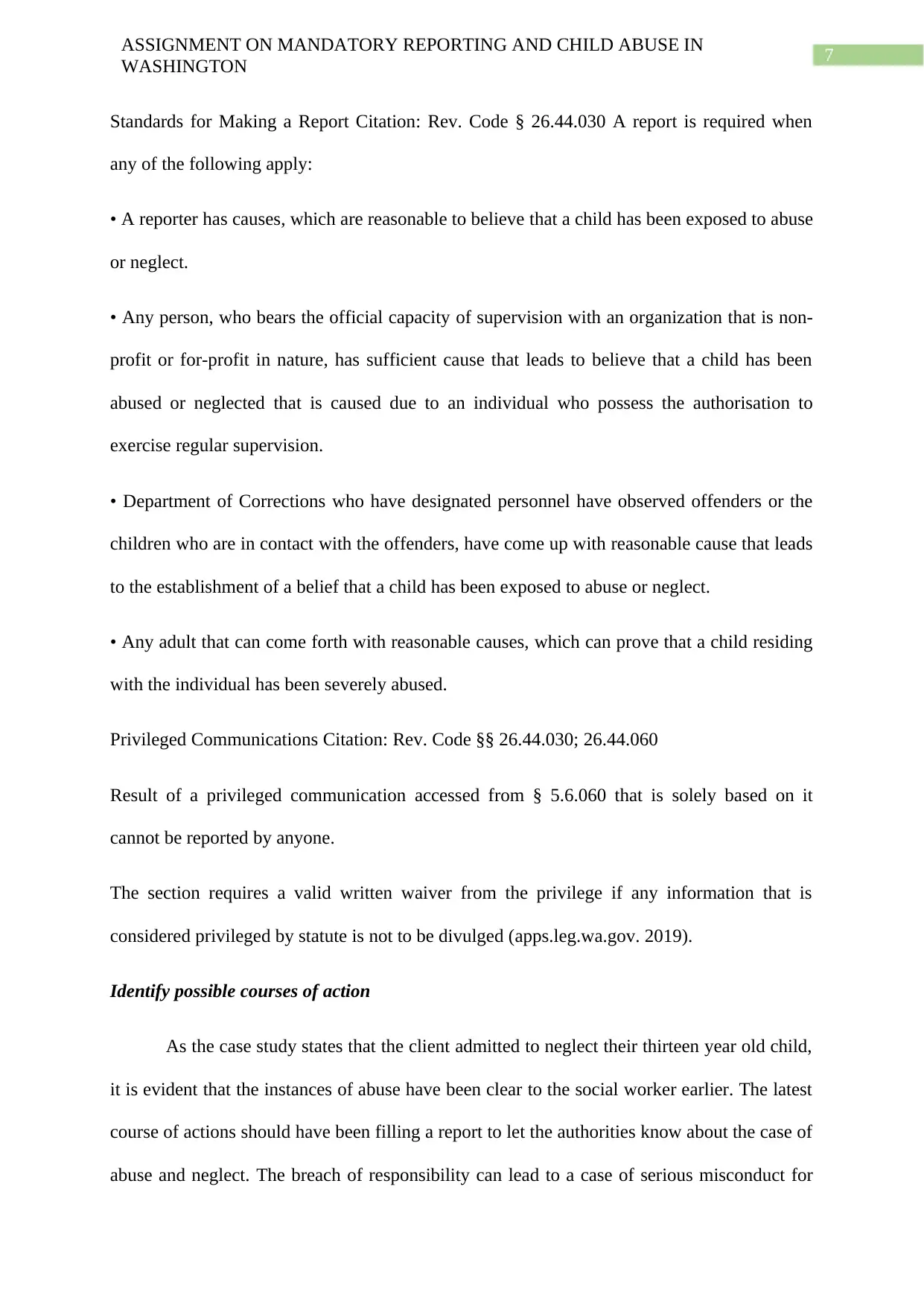
7
ASSIGNMENT ON MANDATORY REPORTING AND CHILD ABUSE IN
WASHINGTON
Standards for Making a Report Citation: Rev. Code § 26.44.030 A report is required when
any of the following apply:
• A reporter has causes, which are reasonable to believe that a child has been exposed to abuse
or neglect.
• Any person, who bears the official capacity of supervision with an organization that is non-
profit or for-profit in nature, has sufficient cause that leads to believe that a child has been
abused or neglected that is caused due to an individual who possess the authorisation to
exercise regular supervision.
• Department of Corrections who have designated personnel have observed offenders or the
children who are in contact with the offenders, have come up with reasonable cause that leads
to the establishment of a belief that a child has been exposed to abuse or neglect.
• Any adult that can come forth with reasonable causes, which can prove that a child residing
with the individual has been severely abused.
Privileged Communications Citation: Rev. Code §§ 26.44.030; 26.44.060
Result of a privileged communication accessed from § 5.6.060 that is solely based on it
cannot be reported by anyone.
The section requires a valid written waiver from the privilege if any information that is
considered privileged by statute is not to be divulged (apps.leg.wa.gov. 2019).
Identify possible courses of action
As the case study states that the client admitted to neglect their thirteen year old child,
it is evident that the instances of abuse have been clear to the social worker earlier. The latest
course of actions should have been filling a report to let the authorities know about the case of
abuse and neglect. The breach of responsibility can lead to a case of serious misconduct for
ASSIGNMENT ON MANDATORY REPORTING AND CHILD ABUSE IN
WASHINGTON
Standards for Making a Report Citation: Rev. Code § 26.44.030 A report is required when
any of the following apply:
• A reporter has causes, which are reasonable to believe that a child has been exposed to abuse
or neglect.
• Any person, who bears the official capacity of supervision with an organization that is non-
profit or for-profit in nature, has sufficient cause that leads to believe that a child has been
abused or neglected that is caused due to an individual who possess the authorisation to
exercise regular supervision.
• Department of Corrections who have designated personnel have observed offenders or the
children who are in contact with the offenders, have come up with reasonable cause that leads
to the establishment of a belief that a child has been exposed to abuse or neglect.
• Any adult that can come forth with reasonable causes, which can prove that a child residing
with the individual has been severely abused.
Privileged Communications Citation: Rev. Code §§ 26.44.030; 26.44.060
Result of a privileged communication accessed from § 5.6.060 that is solely based on it
cannot be reported by anyone.
The section requires a valid written waiver from the privilege if any information that is
considered privileged by statute is not to be divulged (apps.leg.wa.gov. 2019).
Identify possible courses of action
As the case study states that the client admitted to neglect their thirteen year old child,
it is evident that the instances of abuse have been clear to the social worker earlier. The latest
course of actions should have been filling a report to let the authorities know about the case of
abuse and neglect. The breach of responsibility can lead to a case of serious misconduct for
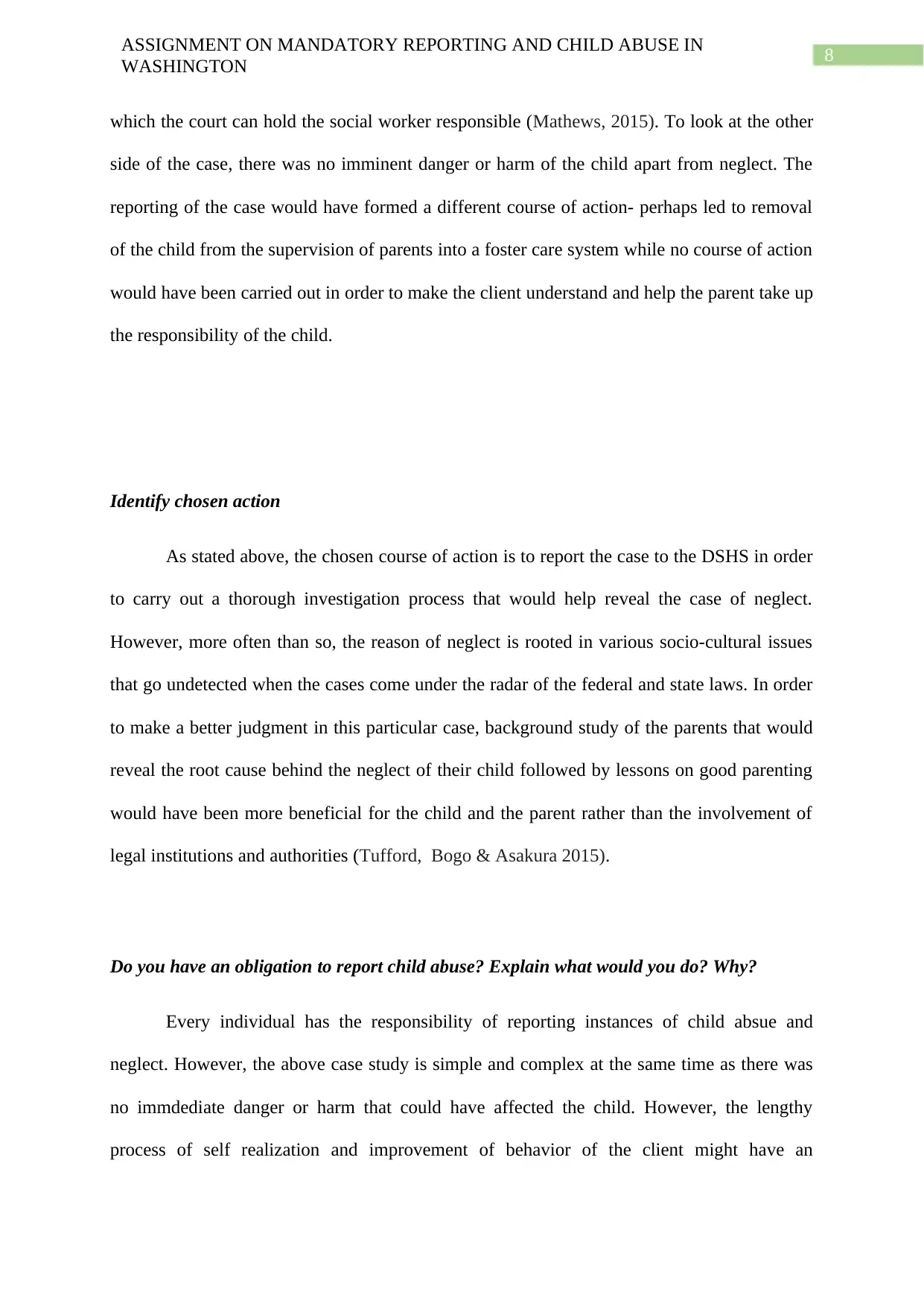
8
ASSIGNMENT ON MANDATORY REPORTING AND CHILD ABUSE IN
WASHINGTON
which the court can hold the social worker responsible (Mathews, 2015). To look at the other
side of the case, there was no imminent danger or harm of the child apart from neglect. The
reporting of the case would have formed a different course of action- perhaps led to removal
of the child from the supervision of parents into a foster care system while no course of action
would have been carried out in order to make the client understand and help the parent take up
the responsibility of the child.
Identify chosen action
As stated above, the chosen course of action is to report the case to the DSHS in order
to carry out a thorough investigation process that would help reveal the case of neglect.
However, more often than so, the reason of neglect is rooted in various socio-cultural issues
that go undetected when the cases come under the radar of the federal and state laws. In order
to make a better judgment in this particular case, background study of the parents that would
reveal the root cause behind the neglect of their child followed by lessons on good parenting
would have been more beneficial for the child and the parent rather than the involvement of
legal institutions and authorities (Tufford, Bogo & Asakura 2015).
Do you have an obligation to report child abuse? Explain what would you do? Why?
Every individual has the responsibility of reporting instances of child absue and
neglect. However, the above case study is simple and complex at the same time as there was
no immdediate danger or harm that could have affected the child. However, the lengthy
process of self realization and improvement of behavior of the client might have an
ASSIGNMENT ON MANDATORY REPORTING AND CHILD ABUSE IN
WASHINGTON
which the court can hold the social worker responsible (Mathews, 2015). To look at the other
side of the case, there was no imminent danger or harm of the child apart from neglect. The
reporting of the case would have formed a different course of action- perhaps led to removal
of the child from the supervision of parents into a foster care system while no course of action
would have been carried out in order to make the client understand and help the parent take up
the responsibility of the child.
Identify chosen action
As stated above, the chosen course of action is to report the case to the DSHS in order
to carry out a thorough investigation process that would help reveal the case of neglect.
However, more often than so, the reason of neglect is rooted in various socio-cultural issues
that go undetected when the cases come under the radar of the federal and state laws. In order
to make a better judgment in this particular case, background study of the parents that would
reveal the root cause behind the neglect of their child followed by lessons on good parenting
would have been more beneficial for the child and the parent rather than the involvement of
legal institutions and authorities (Tufford, Bogo & Asakura 2015).
Do you have an obligation to report child abuse? Explain what would you do? Why?
Every individual has the responsibility of reporting instances of child absue and
neglect. However, the above case study is simple and complex at the same time as there was
no immdediate danger or harm that could have affected the child. However, the lengthy
process of self realization and improvement of behavior of the client might have an
⊘ This is a preview!⊘
Do you want full access?
Subscribe today to unlock all pages.

Trusted by 1+ million students worldwide
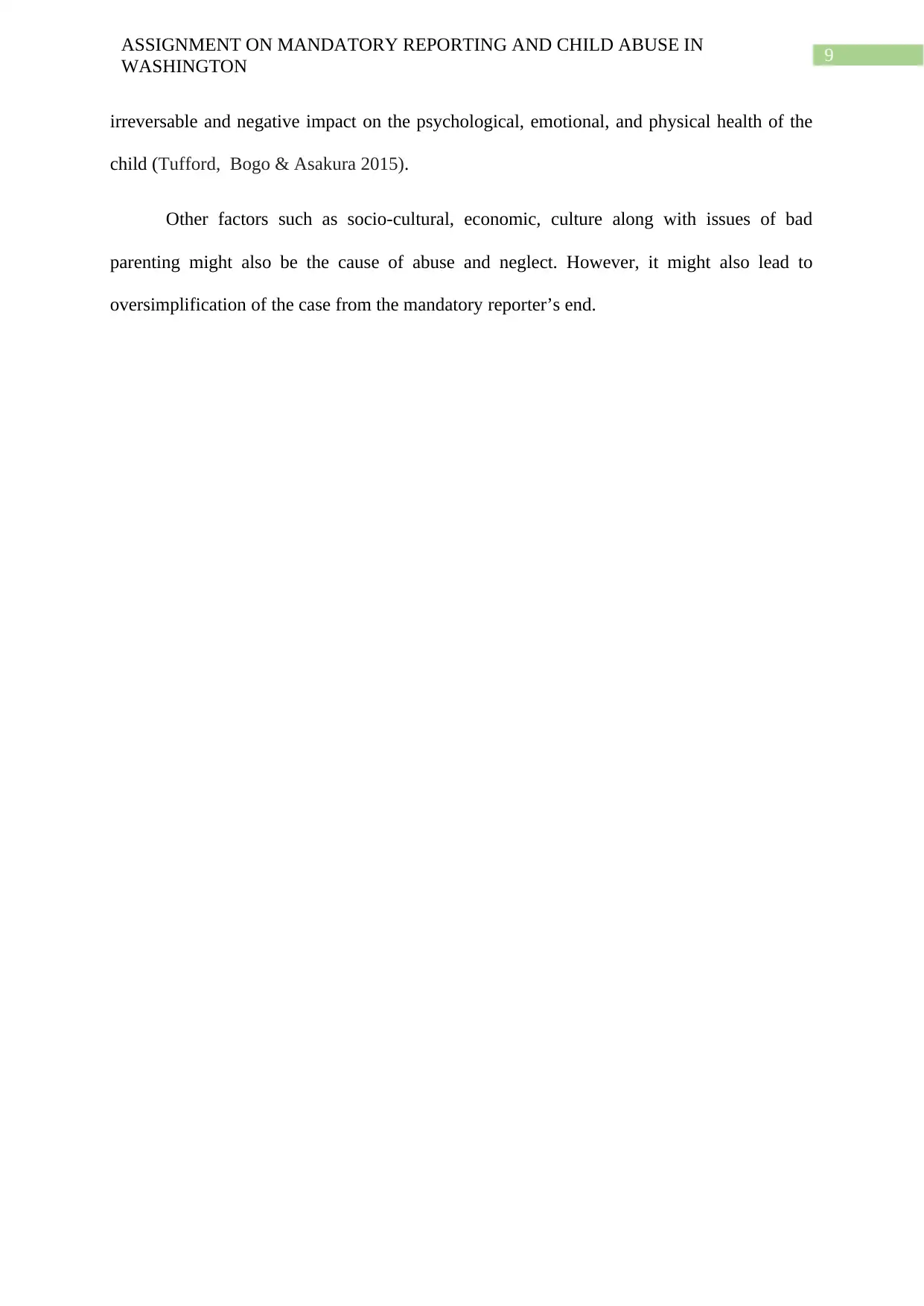
9
ASSIGNMENT ON MANDATORY REPORTING AND CHILD ABUSE IN
WASHINGTON
irreversable and negative impact on the psychological, emotional, and physical health of the
child (Tufford, Bogo & Asakura 2015).
Other factors such as socio-cultural, economic, culture along with issues of bad
parenting might also be the cause of abuse and neglect. However, it might also lead to
oversimplification of the case from the mandatory reporter’s end.
ASSIGNMENT ON MANDATORY REPORTING AND CHILD ABUSE IN
WASHINGTON
irreversable and negative impact on the psychological, emotional, and physical health of the
child (Tufford, Bogo & Asakura 2015).
Other factors such as socio-cultural, economic, culture along with issues of bad
parenting might also be the cause of abuse and neglect. However, it might also lead to
oversimplification of the case from the mandatory reporter’s end.
Paraphrase This Document
Need a fresh take? Get an instant paraphrase of this document with our AI Paraphraser
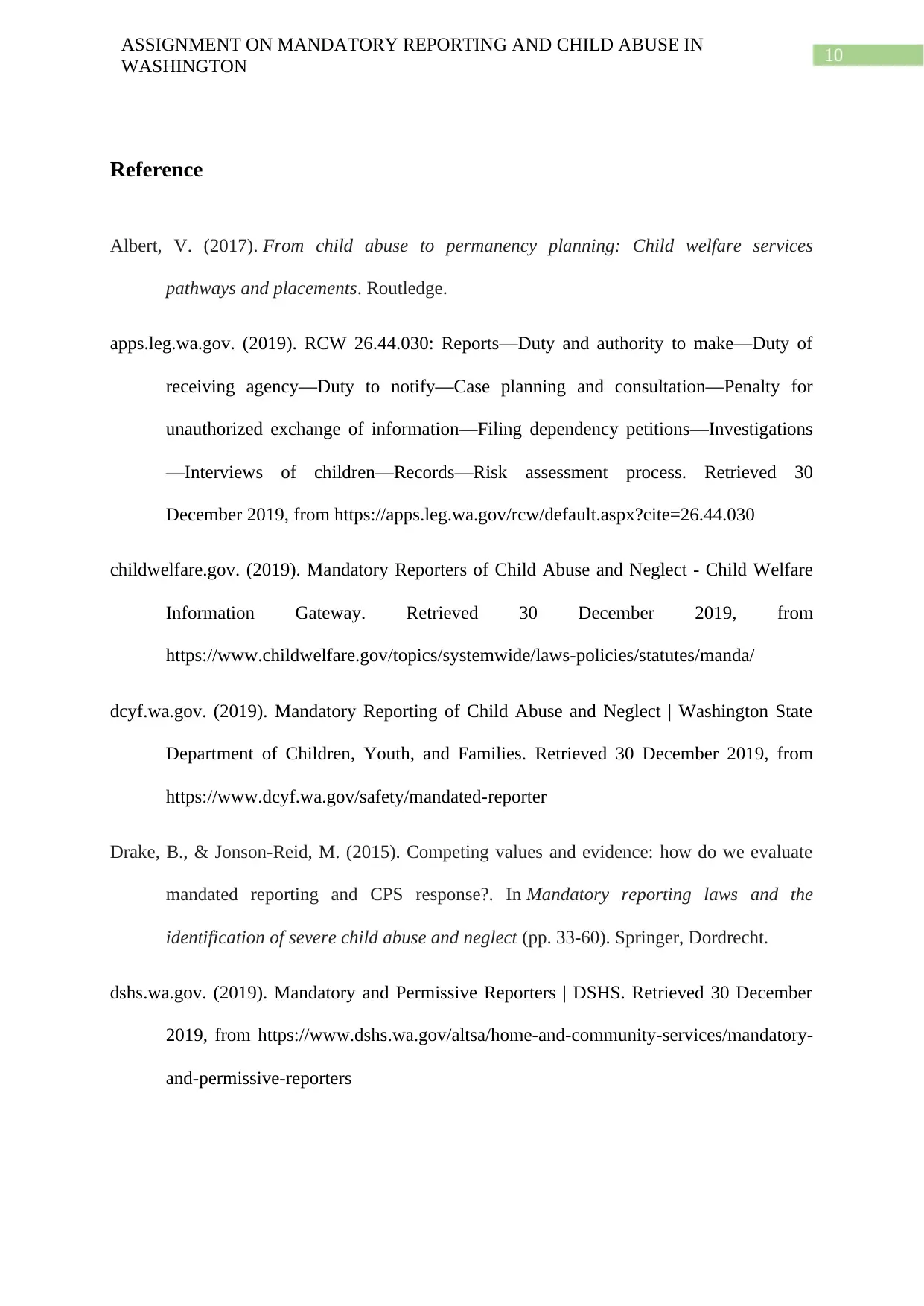
10
ASSIGNMENT ON MANDATORY REPORTING AND CHILD ABUSE IN
WASHINGTON
Reference
Albert, V. (2017). From child abuse to permanency planning: Child welfare services
pathways and placements. Routledge.
apps.leg.wa.gov. (2019). RCW 26.44.030: Reports—Duty and authority to make—Duty of
receiving agency—Duty to notify—Case planning and consultation—Penalty for
unauthorized exchange of information—Filing dependency petitions—Investigations
—Interviews of children—Records—Risk assessment process. Retrieved 30
December 2019, from https://apps.leg.wa.gov/rcw/default.aspx?cite=26.44.030
childwelfare.gov. (2019). Mandatory Reporters of Child Abuse and Neglect - Child Welfare
Information Gateway. Retrieved 30 December 2019, from
https://www.childwelfare.gov/topics/systemwide/laws-policies/statutes/manda/
dcyf.wa.gov. (2019). Mandatory Reporting of Child Abuse and Neglect | Washington State
Department of Children, Youth, and Families. Retrieved 30 December 2019, from
https://www.dcyf.wa.gov/safety/mandated-reporter
Drake, B., & Jonson-Reid, M. (2015). Competing values and evidence: how do we evaluate
mandated reporting and CPS response?. In Mandatory reporting laws and the
identification of severe child abuse and neglect (pp. 33-60). Springer, Dordrecht.
dshs.wa.gov. (2019). Mandatory and Permissive Reporters | DSHS. Retrieved 30 December
2019, from https://www.dshs.wa.gov/altsa/home-and-community-services/mandatory-
and-permissive-reporters
ASSIGNMENT ON MANDATORY REPORTING AND CHILD ABUSE IN
WASHINGTON
Reference
Albert, V. (2017). From child abuse to permanency planning: Child welfare services
pathways and placements. Routledge.
apps.leg.wa.gov. (2019). RCW 26.44.030: Reports—Duty and authority to make—Duty of
receiving agency—Duty to notify—Case planning and consultation—Penalty for
unauthorized exchange of information—Filing dependency petitions—Investigations
—Interviews of children—Records—Risk assessment process. Retrieved 30
December 2019, from https://apps.leg.wa.gov/rcw/default.aspx?cite=26.44.030
childwelfare.gov. (2019). Mandatory Reporters of Child Abuse and Neglect - Child Welfare
Information Gateway. Retrieved 30 December 2019, from
https://www.childwelfare.gov/topics/systemwide/laws-policies/statutes/manda/
dcyf.wa.gov. (2019). Mandatory Reporting of Child Abuse and Neglect | Washington State
Department of Children, Youth, and Families. Retrieved 30 December 2019, from
https://www.dcyf.wa.gov/safety/mandated-reporter
Drake, B., & Jonson-Reid, M. (2015). Competing values and evidence: how do we evaluate
mandated reporting and CPS response?. In Mandatory reporting laws and the
identification of severe child abuse and neglect (pp. 33-60). Springer, Dordrecht.
dshs.wa.gov. (2019). Mandatory and Permissive Reporters | DSHS. Retrieved 30 December
2019, from https://www.dshs.wa.gov/altsa/home-and-community-services/mandatory-
and-permissive-reporters
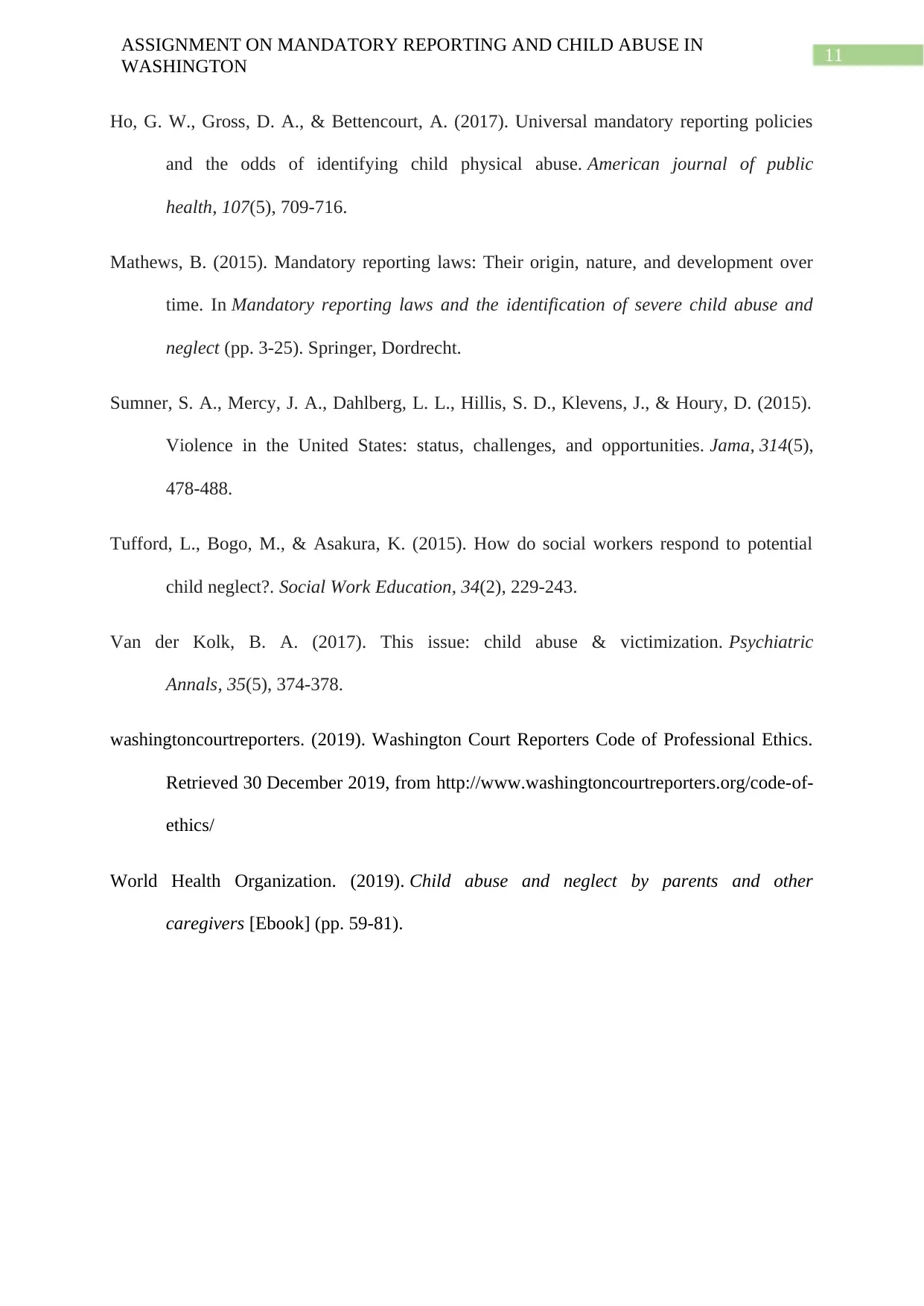
11
ASSIGNMENT ON MANDATORY REPORTING AND CHILD ABUSE IN
WASHINGTON
Ho, G. W., Gross, D. A., & Bettencourt, A. (2017). Universal mandatory reporting policies
and the odds of identifying child physical abuse. American journal of public
health, 107(5), 709-716.
Mathews, B. (2015). Mandatory reporting laws: Their origin, nature, and development over
time. In Mandatory reporting laws and the identification of severe child abuse and
neglect (pp. 3-25). Springer, Dordrecht.
Sumner, S. A., Mercy, J. A., Dahlberg, L. L., Hillis, S. D., Klevens, J., & Houry, D. (2015).
Violence in the United States: status, challenges, and opportunities. Jama, 314(5),
478-488.
Tufford, L., Bogo, M., & Asakura, K. (2015). How do social workers respond to potential
child neglect?. Social Work Education, 34(2), 229-243.
Van der Kolk, B. A. (2017). This issue: child abuse & victimization. Psychiatric
Annals, 35(5), 374-378.
washingtoncourtreporters. (2019). Washington Court Reporters Code of Professional Ethics.
Retrieved 30 December 2019, from http://www.washingtoncourtreporters.org/code-of-
ethics/
World Health Organization. (2019). Child abuse and neglect by parents and other
caregivers [Ebook] (pp. 59-81).
ASSIGNMENT ON MANDATORY REPORTING AND CHILD ABUSE IN
WASHINGTON
Ho, G. W., Gross, D. A., & Bettencourt, A. (2017). Universal mandatory reporting policies
and the odds of identifying child physical abuse. American journal of public
health, 107(5), 709-716.
Mathews, B. (2015). Mandatory reporting laws: Their origin, nature, and development over
time. In Mandatory reporting laws and the identification of severe child abuse and
neglect (pp. 3-25). Springer, Dordrecht.
Sumner, S. A., Mercy, J. A., Dahlberg, L. L., Hillis, S. D., Klevens, J., & Houry, D. (2015).
Violence in the United States: status, challenges, and opportunities. Jama, 314(5),
478-488.
Tufford, L., Bogo, M., & Asakura, K. (2015). How do social workers respond to potential
child neglect?. Social Work Education, 34(2), 229-243.
Van der Kolk, B. A. (2017). This issue: child abuse & victimization. Psychiatric
Annals, 35(5), 374-378.
washingtoncourtreporters. (2019). Washington Court Reporters Code of Professional Ethics.
Retrieved 30 December 2019, from http://www.washingtoncourtreporters.org/code-of-
ethics/
World Health Organization. (2019). Child abuse and neglect by parents and other
caregivers [Ebook] (pp. 59-81).
⊘ This is a preview!⊘
Do you want full access?
Subscribe today to unlock all pages.

Trusted by 1+ million students worldwide
1 out of 12
Related Documents
Your All-in-One AI-Powered Toolkit for Academic Success.
+13062052269
info@desklib.com
Available 24*7 on WhatsApp / Email
![[object Object]](/_next/static/media/star-bottom.7253800d.svg)
Unlock your academic potential
Copyright © 2020–2026 A2Z Services. All Rights Reserved. Developed and managed by ZUCOL.





